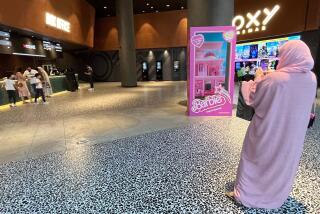Omar Sharif dies at 83; actor’s appeal reached an international stage
- Share via
Omar Sharif first appeared in Western cinema as a mirage.
In David Lean’s 1962 epic “Lawrence of Arabia,” the Egyptian actor — then in his late 20s — made his debut as a shimmering apparition, a mysterious rider partly obscured by the heat rising off the desert floor.
Sharif was playing the character of Sherif Ali, a tribal leader with whom British intelligence officer T.E. Lawrence (Peter O’Toole) helped the Arabs break up the Ottoman Empire. In what seems an eternity, Ali rides his camel toward Lawrence, his flowing black robes and face scarf prolonging the mystery. When he finally reaches the terrified Lawrence, he unwraps his scarf, revealing a strikingly handsome face, exotic elegance and dignified charm.
It was this indelible image that followed Sharif throughout his decades-long career until his death on Friday at 83. He died of a heart attack in a Cairo hospital after suffering from Alzheimer’s disease, according to his agent, Steve Kenis.
“It’s arguably one of the great entrances in the history of film,” British actor Patrick Stewart said Friday of that scene in “Lawrence of Arabia.”
“There was a great deal of dignity about [Sharif] and his work. And I don’t mean an uptight, formal, rigid dignity. There was a charisma, one that wasn’t to do with dazzle and razzmatazz but with an intelligent presence, a thoughtfulness and an empathy that I find very touching.”
Though Sharif was Egyptian, his ethnic good looks were used in a less-globally aware Hollywood to represent different nationalities. Most notably he played the Russian poet-doctor in “Dr. Zhivago” and a Jewish gambler in “Funny Girl.”
Sharif was “an actor’s actor,” said Jack Shaheen, an author who’s written extensively about Arabs and Middle Easterners in cinema. “Not only was he the first Arab star in American cinema, but he played Russians, Jews, Hispanics. He was Che. He was Genghis Khan. He did it all. What I admired about him most of all was his willingness not to be typecast. He would play Arab villains or heroes. If he liked the role, he took it.”
Though Western audiences may have first discovered Sharif in “Lawrence of Arabia,” the actor was already a leading man and romantic interest in 1950s Egyptian cinema — considered a golden era for film in the region. Sharif would go on to prove himself as a heartthrob and versatile actor in Hollywood.
Three years after his American debut, Sharif played the title role in Lean’s adaptation of “Doctor Zhivago,” the Boris Pasternak novel about a sensitive man who finds himself torn between his wife and the love of his life against the backdrop of World War I and the Russian Revolution. Then in 1968, he played the imprisoned husband opposite Barbra Streisand in “Funny Girl.”
Born Michel Demetri Shalhoub in Alexandria, Egypt, on April 10, 1932, to Greek Lebanese parents, Sharif worked in his family’s lumber business before making his way abroad for studies at London’s Royal Academy of Dramatic Art.
He landed his first major role in a 1954 Egyptian drama that was later released in English as “The Blazing Sky.” He began a romance with his costar, actress Faten Hamama, and after he converted to Islam in 1955, the two married.
As for his name change, he said he chose Omar for Gen. Omar Bradley and Sharif because he thought it would be easy for Westerners to pronounce.
Lean discovered Sharif through the dozen-plus Egyptian films he’d had roles in, though the actor recalled that it was his language skills that got him the job. “They looked at photographs of all the Egyptian actors, and David said if he speaks English, bring him here,” Sharif told The Times in 2012.
Sharif earned two Golden Globe Awards and an Oscar nomination for supporting actor for his work in “Lawrence of Arabia.”
For his role as Yuri in “Doctor Zhivago,” Sharif won another Golden Globe and reportedly received 3,000 proposals of marriage after the film debuted in 1965. The film also launched him as a global star.
But Sharif’s international appeal also meant he had to navigate the political minefield of the Middle East. By 1968, a controversy broke out around his role as the heartbreaker Nicky Arnstein in “Funny Girl.”
His on-screen kiss with his Jewish costar, Streisand, came less than a year after the 1967 Arab-Israeli war, and the resulting uproar on both sides nearly cost him his Egyptian citizenship.
“He was handsome, sophisticated and charming,” Streisand said in a statement Friday. “He was a proud Egyptian, and in some people’s eyes, the romantic chemistry between Nicky Arnstein and Fanny Brice transcended stereotypes and prejudice.”
He went on to take on roles in 1970s films such as “The Tamarind Seed” and “The Pink Panther Strikes Again,” but his acting career never reached the heights of the previous decade.
Sharif and his wife divorced in 1974 after having one son, Tarek Sharif.
The actor, however, had also become an accomplished bridge player.
His love for the card game was honed watching his mother play cards with Egypt’s King Farouk, a friend. He played in major competitions and wrote a column for the Chicago Tribune on the game.
Sharif made a critical comeback in the 2003 French film “Monsieur Ibrahim,” playing a Muslim-Turkish shopkeeper who befriends a young Jewish boy. It won him France’s equivalent of an Oscar, the Cesar Award, for best actor and received largely positive reviews in the U.S.
In 2005, the 74-year-old Sharif made the news again, this time, however, it was for an altercation with a parking valet outside a Beverly Hills restaurant. The actor was later fined $100 and ordered by a Superior Court judge to attend anger management classes and serve two years’ probation after pleading no contest to hitting the valet.
“Lawrence of Arabia” was restored in 2012 and released on Blu-ray.
“I wish I could stay as young as the film,” Sharif told The Times then. “I tell you the truth, I couldn’t sit through the whole thing because, you know, too many things came back to my mind. When you look at how you looked then and how you look now, it’s depressing.”
His cinematic entrance in “Lawrence of Arabia” came to symbolize a romanticism about the Middle East that’s since been replaced by religious strife and war. Sharif often spoke fondly of Egypt, where he was born and eventually died.
In his native city, the actor’s passing on Friday drew recollections of his influence. Ahmed Sarwar, an Alexandrian physician in his late 60s, recalled a sense of national pride when Sharif vaulted to international fame in the 1960s.
“Before that, no one had thought of Egypt in this way, as having something other than camels and the pyramids to offer the world,” Sarwar said.
Cairo’s Prime magazine tweeted: “We grew up with your movies and with your passing a bit of us dies.”
Although Sharif made close to 100 movies over his career, he said “Lawrence of Arabia,” “Dr. Zhivago” and “Funny Girl” remained his standouts.
“It’s true when people recognize me these days, those three films are the ones they talk about,” he told The Times in 2003. “But it doesn’t bother me. It’s better than having done none they remember. I find it endearing.”
Times staff writers Steve Zeitchek, Susan King and Laura King also contributed to this report.
More to Read
Start your day right
Sign up for Essential California for the L.A. Times biggest news, features and recommendations in your inbox six days a week.
You may occasionally receive promotional content from the Los Angeles Times.









